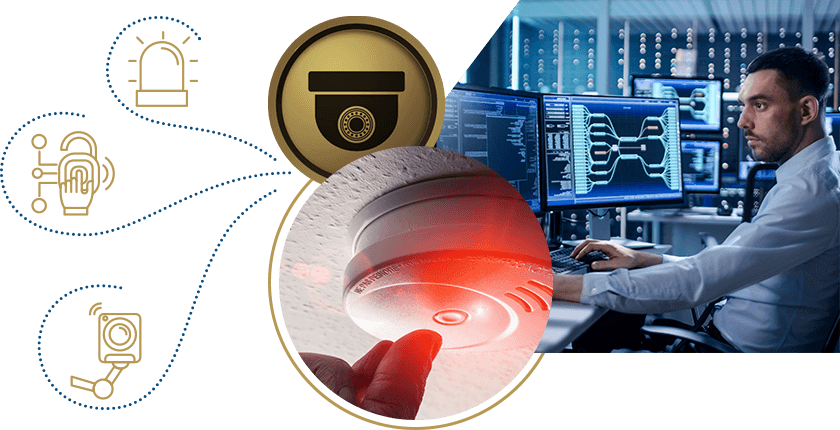Enhancing Safety and Efficiency: The Role of Electronic Security Solutions in Facility Management in India
In today’s fast-paced and digitally interconnected world, ensuring safety and operational efficiency is a top priority for businesses, institutions, and residential complexes alike. With increasing security threats and the demand for seamless infrastructure maintenance, the convergence of electronic security solutions and facility management in India is playing a crucial role in protecting assets and streamlining operations.
This blog explores how electronic security is transforming the facility management landscape in India, offering smarter, more responsive systems for safer and more efficient environments.
The Evolving Landscape of Facility Management in India
Facility management in India has undergone a significant transformation over the last decade. No longer limited to housekeeping and maintenance services, modern facility management encompasses a wide array of integrated services including infrastructure maintenance, energy management, workforce optimization, and now—security management.
With India's rapid urbanization, rise in commercial real estate, smart cities initiatives, and an expanding IT sector, facility managers are under pressure to ensure seamless operations with high standards of safety and compliance. This is where the integration of electronic security solutions becomes not just beneficial, but essential.
What are Electronic Security Solutions?
Electronic security solutions refer to the use of electronic equipment and digital technology to safeguard people, property, and data. These systems include:
-
CCTV Surveillance Systems
-
Access Control Systems (biometric, RFID, smart card)
-
Intrusion Detection Systems
-
Fire and Smoke Alarms
-
Automated Gates and Barriers
-
Video Door Phones
-
Integrated Command and Control Centers
When integrated with building management and facility management systems, these tools not only provide enhanced security but also contribute to efficient operations.
The Synergy Between Security and Facility Management
Facility managers are increasingly adopting electronic security solutions as part of their core strategy. Here’s how the integration benefits them:
1. Real-Time Monitoring and Surveillance
One of the biggest advantages of electronic security is the ability to monitor premises in real time. CCTV systems and cloud-based surveillance allow facility managers to keep an eye on multiple sites simultaneously. This is particularly useful for large campuses, business parks, and multi-tenant buildings where manual monitoring may not be sufficient.
2. Access Control and Visitor Management
Integrating access control systems helps restrict unauthorized entry and maintains a digital log of all entries and exits. This is crucial for high-security zones such as data centers, R&D facilities, and government institutions. Electronic visitor management systems also replace paper logs, improving both security and operational transparency.
3. Alarm Systems and Emergency Alerts
Fire alarms, smoke detectors, and intrusion alerts are vital in preventing and responding to emergencies. Advanced systems can immediately notify facility managers and emergency responders, reducing response times and potentially saving lives and property.
4. Integration with Smart Building Technologies
Modern facilities in India are increasingly adopting IoT and AI-powered systems. Electronic security solutions can be integrated with HVAC, lighting, and energy management systems. This integration enables centralized control and analytics, optimizing resource usage while maintaining security protocols.
5. Data-Driven Decision Making
Electronic systems generate a wealth of data that can be analyzed to identify patterns, predict maintenance needs, and enhance preventive measures. For instance, access logs can help identify peak usage hours or detect unusual activities, allowing for better planning and risk management.
Growing Demand for Electronic Security in India
The Indian electronic security market is projected to grow rapidly in the coming years, driven by rising safety concerns, regulatory compliance needs, and a shift toward smart infrastructure. Several sectors are contributing to this demand:
-
Commercial and IT Parks – Need round-the-clock security and controlled access.
-
Residential Complexes – Rising demand for gated security, surveillance, and intercoms.
-
Retail Chains and Malls – Require crowd management and anti-theft systems.
-
Hospitals and Educational Institutions – Focus on safeguarding people and sensitive data.
-
Government Buildings and Critical Infrastructure – High-security protocols and real-time monitoring.
With these rising requirements, facility management companies are aligning themselves with tech-driven service models that prioritize security.
Challenges in Implementation
While the benefits are vast, integrating electronic security solutions into facility management in India does present some challenges:
-
Cost of Installation and Maintenance – Initial setup can be capital-intensive, especially for SMEs or older buildings.
-
Technology Integration – Compatibility with existing infrastructure may require system upgrades.
-
Training and Awareness – Facility staff need to be trained to use and maintain electronic systems effectively.
-
Data Privacy and Cybersecurity – As systems become more connected, they also become more vulnerable to cyber threats.
However, the long-term benefits of reduced risk, operational efficiency, and compliance with safety standards far outweigh these challenges.
The Future of Facility Management with Electronic Security
The future of facility management in India is inseparably linked with advancements in electronic security solutions. Emerging technologies like AI-based facial recognition, drone surveillance, predictive analytics, and cloud-based monitoring platforms are set to revolutionize how facilities are managed.
Moreover, with growing emphasis on ESG (Environmental, Social, and Governance) goals, integrating smart and secure systems contributes to sustainability and corporate responsibility initiatives.
Outsourcing to specialized facility management firms that offer bundled services—including security—will continue to grow, especially in tier 1 and tier 2 cities where demand for efficient building operations is high.
Conclusion
The integration of electronic security solutions within the scope of facility management in India is not just a trend but a necessity in the modern age. As security threats evolve and infrastructure becomes more complex, combining smart security with proactive facility management ensures safety, compliance, and operational excellence.
For businesses, institutions, and residential facilities looking to future-proof their operations, adopting integrated electronic security and facility management solutions is the way forward.




Comments
Post a Comment